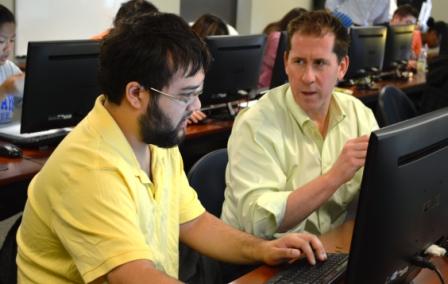Back to the Classroom: College Leaders Attend Landmark Classes
By Solvegi Shmulsky

President’s Council is the Landmark’s leadership body, responsible for major divisions within the College, including enrollment management, academic affairs, and LCIRT. The entire PC – which, in addition to Dr. Peter Eden, Landmark College’s president, comprises 10 vice presidents, deans, and directors - attended classes during the fall semester, and they plan to do it again in spring 2014.
“All good leaders or managers must know their business,” said Dr. Eden. “Our business is education; our business is providing for and understanding our college students. I want PC members to experience what Landmark does every day in a learning environment, and I want students and faculty to know who sits on PC.”
When asked why connections among administration, students and faculty are important, Dr. Eden responded, “PC members and myself make decisions that affect our business and thus our faculty and students. The understanding created by class visits, as just one example, will help us wrestle with difficult decisions and strategic planning.”
What happened during the visits? PC sampled from across the curriculum—from statistics and biology to interpersonal communications and positive psychology. Leaders saw engaging, hands-on activities, tuned-in students, and instructors teaching to diverse groups.
“I attended the Interpersonal Communications class with Liza Burns,” said Greg Matthews, vice president for enrollment management. “It was a fantastic experience,” said Matthews. “I have attended classes at other colleges much like I did here, and I have been an adjunct. Liza had a remarkable style of teaching. While addressing the subject matter, she frequently directed comments and questions to individual students, engaging them in what was as much a conversation as it was instruction. It was clear that Liza understood the learning differences in the class; I was impressed.”
Corinne Bell, chief technology officer and director of IT services, visited introduction to biology, taught by Rich Grumbine. Bell noted Grumbine’s clear agenda, willingness to review expectations, flexibility, and multi-modal teaching style. “There were lots of hands-on activities, and students seemed to enjoy the variety,” Bell explained.
When describing the ecology activity she saw, Bell said, “Students collected samples of bugs, vegetation, temperature, and other variables on a section of the campus lawn and in a section of the woods to compare information—I really enjoyed working with the students during the outdoor activity.” She also noted Grumbine’s flexibility and willingness to nurture the interests of his students. She said, “Rich was perceptive, and he provided individual attention when students got stuck or needed help. One student was particularly interested in a spider that had been found, so Rich provided him a book that listed all types of spiders with pictures. Since this was outside the purpose of the class, Rich helped them get back on track.”
Chelsea Gwyther, vice president for institutional advancement, visited the educational psychology class of Jim Baucom. She commented on the academic vigor and curiosity of the students in the class. She said, “What struck me was just how smart the students in this class are. The depth of their conversation was impressive. Jim did a great job at getting the students to think about personal experiences that related to the concepts he was talking about.”
Dr. Eden did not just encourage PC members to go to classes – he attended two classes, as well. “I visited Frank Klucken's statistics course, and Dr. Mac Gander's composition and rhetoric course,” said Dr. Eden. “They continually engaged students without dominating the environment—their humility and accessibility were abundantly obvious.
“Because we have a unique mission, we tend to feel like we are ‘terminally unique,’ or that nobody is like us and we are like nobody else. But as I sat and listened to students in these courses, I felt as though I could be in any college in the U.S.”
Noting what makes a Landmark College classroom unique, Dr. Eden said, “While our students are like their peers elsewhere, I was continually reminded of the approaches taken by these professors, in terms of managing the dialogue, input, participation, knowledge gathering. Their skill and proximity to students made it clear why our model works so well.”
Other PC members and the classes they visited this fall are:
- Brent Betit, senior vice president, attended Tom Hinckley’s Introduction to Biology and Organisms class.
- Manju Banerjee, vice president and director of the Landmark College Institute for Research and Training, attended Peg Alden’s Introduction to Cultural Anthropology class.
- Michael Luciani, dean of students, visited Michelle Bower’s Mathematical Ideas class.
- Adrienne Major, academic dean, visited Jim Cabral’s Introduction to Sociology class.
- Jon MacClaren, vice president for administration and finance, attended Anita Long’s College Algebra class.
- Mark DiPietro, director of marketing communications, visited Geoff Burgess’ Introduction to Communication class.
- Carol Nardino, director of advancement, alumni relations and special events, attended Solvegi Shmulsky’s Introduction to Psychology class.
By visiting classes, those entrusted to run the institution experienced the mission in a tangible way. PC members saw students engaged in learning alongside their peers—students whose academic potential, ambition, and neurodiverse profiles have led them to Landmark College. Students and faculty saw leaders who went above and beyond their normal responsibilities to understand the environment they are working for and influencing.
Landmark College was the first institution of higher learning to pioneer college-level studies for students with dyslexia. Today Landmark College, offering two and four-year degree options, a graduate level certificate in universal design with technology integration, and summer programs for students who learn differently, is a global leader in integrated teaching methods for students with dyslexia and other learning disabilities, ADHD, and ASD. Students, faculty, and other professionals from all over the world are drawn to Landmark College for its innovative educational model—designed through research and practice to help all students who learn differently become confident, self-empowered, and independently successful learners.
Share this story with your friends and colleagues on: